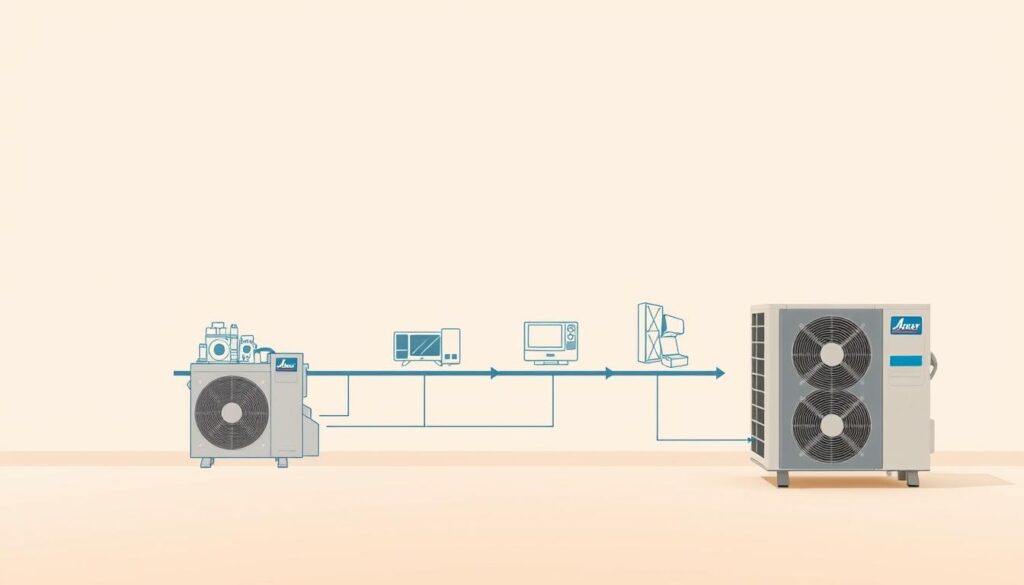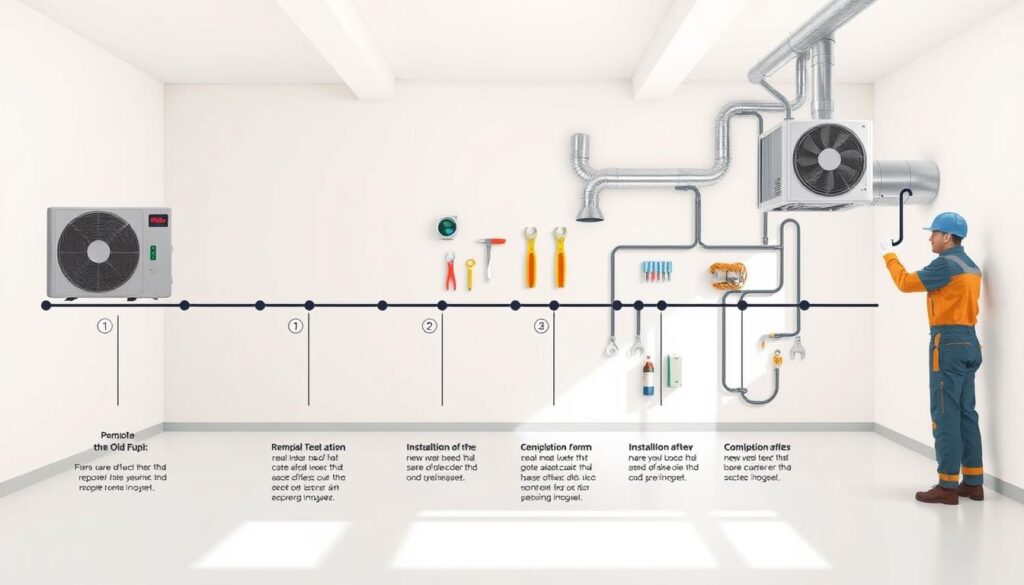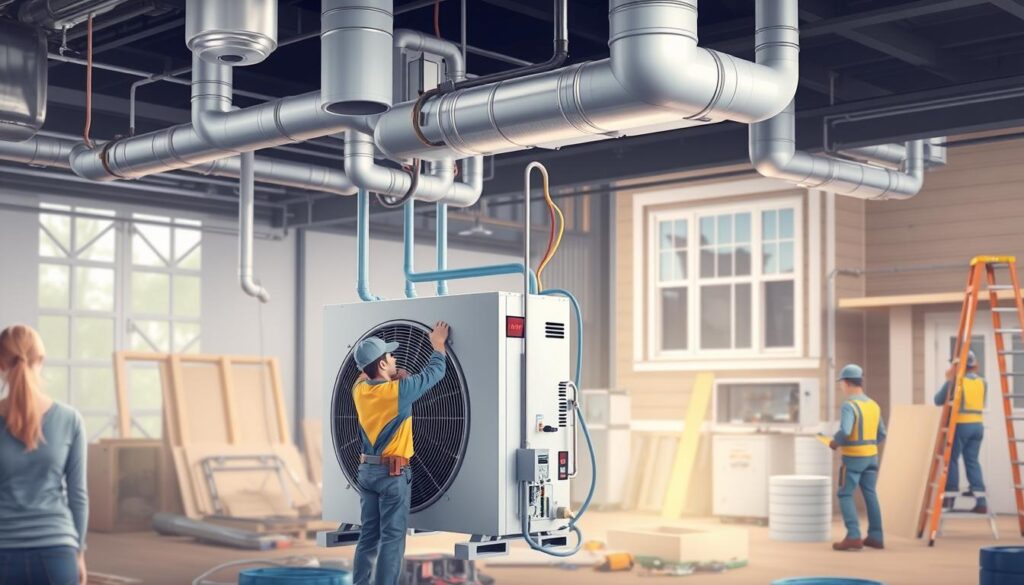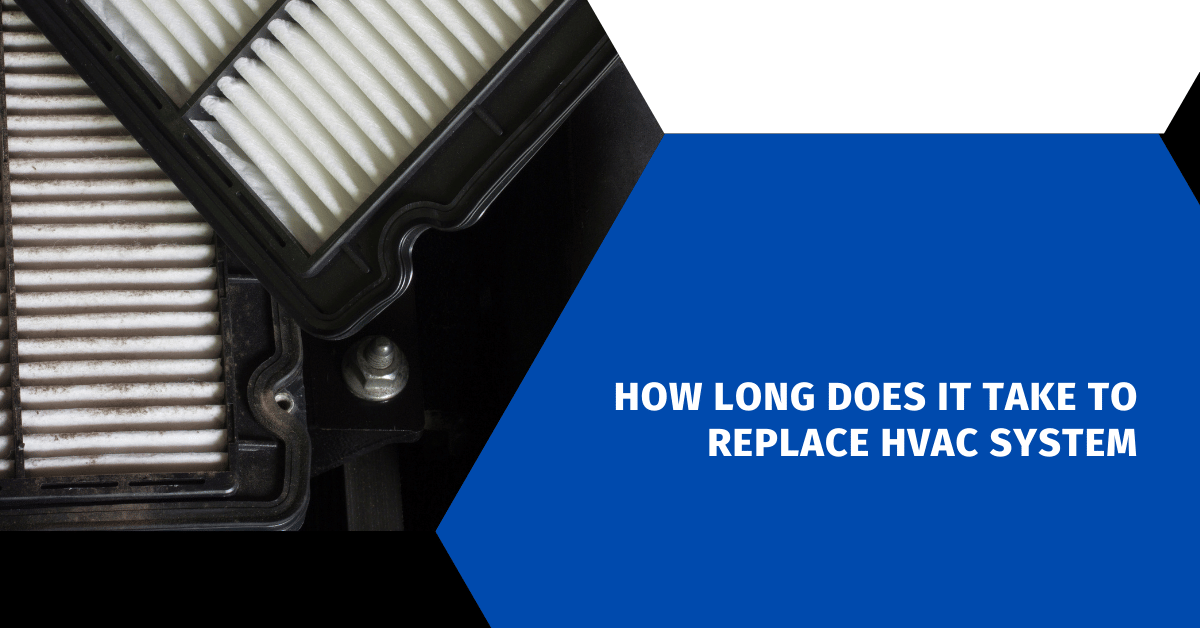Affiliate Disclosure
HVAC Guide Guys is a participant in the Amazon Services LLC Associates Program, an affiliate advertising program designed to provide a means for sites to earn advertising fees by advertising and linking to Amazon.
How Long Does It Take to Replace HVAC System? Ever wondered how quickly an HVAC system can change your home’s comfort? Knowing the hvac replacement timeline is key for homeowners planning a big upgrade.

Replacing your HVAC system is more than a technical update—it’s an investment in your home’s comfort and energy savings. The time it takes to replace your HVAC system varies a lot. This depends on several factors.
From simple central air replacements that take 4-8 hours to complex full system installations that take several days, the process varies. It depends on your home’s needs and the type of system you choose.
Key Takeaways
- Most HVAC replacements complete within 1-5 days
- Central air installations typically require 4-8 hours
- Complex systems like geothermal can take several days
- Home layout and existing infrastructure impact installation time
- Professional technicians significantly influence project duration
Table of Contents
Understanding HVAC System Replacement Basics
Replacing your HVAC system is a big home improvement project. It needs careful planning and understanding. The cost and time for installation vary a lot. Knowing this helps make the process smoother and more efficient.
Modern HVAC replacements are more than just swapping old for new. They involve a detailed check of your home’s heating and cooling needs.
What is Included in HVAC Replacement
- Complete system assessment
- Equipment removal
- New unit installation
- Ductwork inspection and possible changes
- Check if the electrical system is compatible
Why Timing Matters in HVAC Installation
Choosing the right time for your HVAC replacement is key. It affects both how well it works and the cost. A typical replacement takes four to six hours. More complex jobs might take three to four days.
Pre-Installation Requirements
| Requirement | Details |
|---|---|
| Home Assessment | Manual J calculation to find out exact heating and cooling needs |
| Budget Preparation | Average costs are between $6,700 and $12,100 |
| Energy Efficiency Considerations | Choose ENERGY STAR® units with SEER ratings over 13 |
Homeowners might get big financial help. This includes up to $8,000 in state rebates and $2,000 in federal tax credits for heat pumps. Getting quotes from three local HVAC companies helps you decide.
Explore Our HVAC Shop
Looking for top-rated HVAC tools, parts, and accessories? Visit our shop and find the perfect solution for your needs.
Visit the ShopFactors That Impact Installation Duration
Replacing your HVAC system involves several key factors that affect the installation time. Knowing these helps you prepare better and understand what to expect from your HVAC contractors.
The size of your home is a big factor. Bigger homes need more complex systems and longer ductwork. This can make the installation take from 4 hours to several days.
- Home size and square footage
- Complexity of the HVAC system
- Condition of existing ductwork
- Accessibility of installation areas
Different HVAC brands have their own installation needs. Systems like heat pumps or geothermal units take longer than standard central air units. Your HVAC contractors will look at your needs and give you a detailed timeline.
Other things that affect the time include:
- Electrical system compatibility
- Permit acquisition time
- Potential structural modifications
- Post-installation inspections
The skill of your HVAC contractors is also important. Experienced pros can handle complex jobs faster. They make sure the system works well and saves time.
Explore Our HVAC Shop
Looking for top-rated HVAC tools, parts, and accessories? Visit our shop and find the perfect solution for your needs.
Visit the ShopAverage Timeframes for Different HVAC Systems
Knowing how long it takes to replace AC systems helps you plan better. Each system has its own needs and time requirements. This affects how long your project will take.
Installing HVAC systems needs careful planning and precision. The time it takes to replace heating systems depends on several things. These include your home’s size, current setup, and the new system.
Central Air Conditioning Installation
Installing central air conditioning usually takes 4-8 hours. This assumes:
- Existing ductwork is in good shape
- No big changes to the structure are needed
- Technicians can easily access the area
Heat Pump Installation
Heat pumps need 6-10 hours to install. This is because they handle both heating and cooling. This makes the setup more complex.
| HVAC System Type | Average Installation Time | Key Considerations |
|---|---|---|
| Central Air Conditioning | 4-8 hours | Good ductwork condition |
| Heat Pump | 6-10 hours | Dual function complexity |
| Full System with Ductwork | 3-5 days | Extensive infrastructure work |
Full System with Ductwork
Replacing a full system, including ductwork, can take 3-5 days. This longer time allows for:
- Thorough infrastructure check
- Redesigning ductwork if needed
- Updating the electrical system
- Testing the system fully
“The right HVAC system installation takes time, but ensures years of reliable home comfort.” – HVAC Professional
Keep in mind, these times are just estimates. Your actual installation might take longer due to your home’s specifics and the system’s complexity.
Explore Our HVAC Shop
Looking for top-rated HVAC tools, parts, and accessories? Visit our shop and find the perfect solution for your needs.
Visit the ShopHow Long Does It Take to Replace HVAC System

Knowing how long it takes to replace an HVAC system is key for homeowners. The time needed can change a lot based on several important factors.
When looking at how long it takes to replace an HVAC system, most jobs fall into a certain range:
- Simple air conditioner replacement: 4-8 hours
- Full system replacement: 3-5 days
- Furnace and AC unit replacement: 8-14 hours
Your exact installation time depends on many things. Home size, system complexity, and existing infrastructure are all important. They help figure out how long the replacement will take.
| Installation Type | Estimated Duration |
|---|---|
| Changeout AC Installation | Less than 1 day |
| Full System Replacement | 3-5 days |
| Ductwork Replacement | Up to 4 days |
“Proper preparation and minimal distractions can significantly reduce your HVAC installation time.”
Things that can affect how long it takes include your home’s layout and how easy it is to get to the areas where the system will be installed. Also, the type of HVAC system you choose can play a role. Bigger homes might need more work, which can make the job take longer.
To make the replacement go smoothly, work well with your HVAC expert. Also, get your home ready for the installation before it starts.
Location and Accessibility Considerations
The time it takes to install your HVAC system can change a lot based on where it goes. Each spot has its own set of challenges that affect how long and complicated the job is.
When you’re planning to replace your HVAC system, knowing the exact spot for installation is key. The ease of getting to your site and its structure will greatly impact how long the installation takes.
Attic Installations: Navigating Tight Spaces
Installing in the attic usually takes more time and special tools. Technicians face:
- Limited working space
- Potential structural constraints
- Temperature and ventilation challenges
- Precise equipment maneuvering
Basement Setups: Strategic Placement Options
Basements can make HVAC installation faster if they’re well-planned. Important factors include:
- Existing infrastructure
- Ductwork accessibility
- Electrical connection proximity
- Room for equipment movement
Outdoor Unit Placement Strategies
Choosing the right spot for the outdoor unit is critical. HVAC experts look at:
- Clearance requirements
- Potential environmental obstructions
- Noise reduction considerations
- Optimal airflow and performance
Pro tip: Talk to your HVAC pro about where to install to avoid problems and cut down on installation time.
Explore Our HVAC Shop
Looking for top-rated HVAC tools, parts, and accessories? Visit our shop and find the perfect solution for your needs.
Visit the ShopProfessional Installation Process Steps

Choosing professional HVAC contractors means you’re getting a detailed and careful installation. They use a thorough method to make sure your new HVAC system works perfectly.
The process starts with a detailed site assessment. HVAC experts check your home’s needs, measuring spaces and looking at current setups. This step helps them plan the best way to install your new system.
- Initial system inspection and measurements
- Removal of old HVAC equipment
- Preparation of installation area
- New system placement and connection
- Comprehensive system testing
Every technician must have EPA certification to work with refrigerant legally. They use special machines to handle old parts safely and protect the environment.
| Installation Step | Typical Duration | Key Considerations |
|---|---|---|
| System Removal | 1-2 hours | Safe disconnection and disposal |
| New Unit Installation | 4-6 hours | Precise mounting and connection |
| Final Testing | 1 hour | Performance verification |
Professional HVAC contractors focus on accuracy. They install new refrigerant lines carefully, secure parts regularly, and check the condensate drain line. They also do a follow-up check within days to make sure everything works right and fix any problems.
Common Installation Challenges and Solutions
When you plan to replace your HVAC, you might face several obstacles. These can affect your cost and how long the project takes. Knowing about these challenges helps you get ready and avoid surprises during installation.
Installing a new HVAC system can be tricky. Technicians have to deal with technical and structural problems. These can make the project take longer and cost more.
Ductwork Modifications
Old ductwork often needs big changes to work right. You might face:
- Outdated duct designs
- Improper sizing
- Air leakage points
- Structural obstructions
Fixing these problems might mean custom fabrication or replacing the ductwork. This can add a lot of time and money to your project.
Electrical Requirements
Modern HVAC systems need special electrical setups. Older homes might need big electrical upgrades. This includes:
- Circuit panel enhancements
- Wiring replacements
- Voltage compatibility checks
- Grounding system evaluations
Structural Limitations
Your home’s structure can cause installation problems. Tight spaces, complex roofs, or basements might need special tools or more workers. This can make your project cost more.
Professional preparation and thorough assessment can mitigate most installation complications.
Skilled HVAC pros will do detailed checks before starting. They aim to find and fix problems early. This makes the replacement process smoother and faster.
Explore Our HVAC Shop
Looking for top-rated HVAC tools, parts, and accessories? Visit our shop and find the perfect solution for your needs.
Visit the ShopTips to Speed Up Your HVAC Replacement
Replacing your HVAC system doesn’t have to be hard. With the right planning, you can make it faster and less disruptive to your comfort.
Smart scheduling is key to a quick replacement. Here are some tips to help you:
- Schedule during off-peak seasons (spring or fall)
- Clear installation areas in advance
- Prepare documentation and home access
- Communicate clearly with contractors
Installing your HVAC in the off-season can save a lot of time. Contractors usually have more time in spring and fall. This means you might get your system installed faster.
“Preparation is the key to a smooth HVAC replacement experience” – HVAC Industry Expert
Getting ready before the install day can save a lot of time. Make sure to:
- Remove furniture and obstacles near the HVAC system
- Gather all the necessary home documents
- Check if the electrical panel is easy to access
- Clear paths for the technicians
Planning ahead can cut down installation time by up to 30%. This makes the whole process easier for everyone involved.
Conclusion
Understanding the hvac replacement timeline can make things easier. Different systems like gas furnaces, electric furnaces, and heat pumps need different times to install. This time varies from 4 to 24 hours, depending on your home’s needs.
Several factors affect your HVAC replacement journey. These include your home’s size, the condition of your ductwork, and how complex the system is. Professional technicians can make the installation quick, usually in 1-2 days for most homes.
Keep in mind, your hvac replacement timeline can change based on your home and system specifics. Working with skilled HVAC professionals helps avoid delays and problems. This way, you get a system upgrade that keeps your home comfortable and efficient.
Spending time on preparation and choosing the right team is key. It leads to a dependable heating and cooling system for your home. This system will work well for many years.

